
No story on Shyam Ahuja, an obstinate bull of a man, can begin without the dhurrie. Hard as it may be to imagine today, the dhurrie-the most iconic and ubiquitous of Indian flatweaves-had all but disappeared by the 1960s. There were no weavers, no buyers, and no interest for a textile that could trace its lineage back to the Harappan civilization. My grandfather helped change that, and with it, altered the course of Indian handloom.
Shyam, then a successful businessman and wool buyer for Tattersfield & Co., Philadelphia, stumbled upon the dhurrie on a visit to a jail workshop in Rajasthan in 1968. Determined to find an outlet for his creative bent, and recognizing the dhurrie's potential as a woven canvas, he resolved to sell the textile in America, a market that was familiar to him. Yet in those days, he encountered an industry that wanted nothing to do with him. He would often recount those moments to me later in life, "I wasn't even allowed to cross the doorsteps of most major furnishings stores," he'd say, telling me how they had no regard for Indian craftsmanship. These slights, often tinged with a racial bias and delivered with condescension, made him physically ill. Yet, he persevered, cold-calling his way to meetings till he finally met Irwin Corey, of the Rosecore Carpet Company in New York, and received his first export order: one cotton dhurrie.
هذه القصة مأخوذة من طبعة July - August 2022 من AD Architectural Digest India.
ابدأ النسخة التجريبية المجانية من Magzter GOLD لمدة 7 أيام للوصول إلى آلاف القصص المتميزة المنسقة وأكثر من 9,000 مجلة وصحيفة.
بالفعل مشترك ? تسجيل الدخول
هذه القصة مأخوذة من طبعة July - August 2022 من AD Architectural Digest India.
ابدأ النسخة التجريبية المجانية من Magzter GOLD لمدة 7 أيام للوصول إلى آلاف القصص المتميزة المنسقة وأكثر من 9,000 مجلة وصحيفة.
بالفعل مشترك? تسجيل الدخول

AS NEW DELHI'S GALLERY ESPACE MARKS ITS 35TH ANNIVERSARY, AD LOOKS AT GALLERIST RENU MODI'S JOURNEY IN ART.
The New Delhi-based Gallery Espace, founded by Renu Modi in 1989, recently marked its 35th anniversary with two special exhibitions.
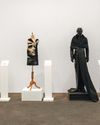
ROCHELLE PINTO, EDITOR OF VOGUE INDIA, WRITES ABOUT FORCES OF FASHION, WHICH PUT 39 UNIQUE WORKS UNDER ONE ROOF, PIECING TOGETHER A SHORT HISTORY OF FASHION IN INDIA.
If you want to step into the mind of Cristóbal Balenciaga, the game-changing Spanish couturier who died over 50 years ago, all you have to do is beg, bribe or charm your way into 10 Avenue George V in Paris.
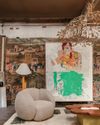
AS INVISIBLE COLLECTION COMES TO INDIA, FOUNDERS ISABELLE DUBERNMALLEVAYS AND LILY FROEHLICHER SHARE THEIR SERENDIPITOUS JOURNEY TO THE COUNTRY.
Isabelle Dubern-Mallevays and Lily Froehlicher first found India at their doorstep when Sonam Kapoor Ahuja borrowed a few pieces from their collection for an AD India cover story in 2021.
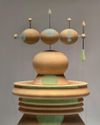
ANONYMOUS ARTIST PRINCESS PEA SHOWCASES A COLLECTION OF NINE NEW PRINTS AT THE SOHO HOUSE LOUNGE AT ART MUMBAI.
In Princess Pea's new collection of works, poetry, craft and the divine femininity coalesce with grace.

ARTISTS RITU AND SURYA SINGH'S WONDERLAND OF A HOMESTUDIO IN THE PINK CITY URGES YOU TO LOOK AT THE BEAUTY AND NARRATIVE OF WASTE.
Husband-wife artist duo Ritu and Surya Singh, better known as Wolf, live at \"The Farm\", a unique 20-acre madhouse of wonders in the heart of Jaipur.

KENGO KUMA TALKS TO AD ABOUT HIS DESIGN ADDITIONS AS THE CENTRO DE ARTE MODERNA GULBENKIAN IN LISBON OPENS ITS DOORS AGAIN.
Everyone who has lived in Lisbon likely has a fond memory of the Gulbenkian complex.
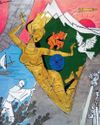
FROM HIS REVERENCE FOR GANDHI TO HIS LOVE OF DANCE, A BOOK BY DAG OFFERS NEW WAYS TO KNOW MF HUSAIN.
If there was ever an Indian artist who earned immense fame and yet remained unknowable, it is MF Husain.

WHAT WOULD BAWA DO? WONDERS APARNA RAO, COFOUNDER OF PHANTOM HANDS, AS SHE PRODUCES REISSUES OF GEOFFREY BAWA'S HIGHLY CONTEXTUAL FURNITURE.
In mid-December last year, in the freshly restored Kannangara House designed by Geoffrey Bawa in 1959, an exhibition based on the late Sri Lankan master's furniture designs opened.
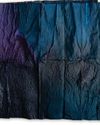
BANGLADESHI ARTIST AYESHA SULTANA'S RECENT DUBAI EXHIBITION EXPLORED THE DUAL NATURE OF STRENGTH AND FRAGILITY.
Born in Bangladesh in 1984, the US-based Ayesha Sultana explores notions of form, space and materiality.

WE CATCH UP WITH TARIK CURRIMBHOY AT HIS STUDIO IN NEW YORK, AFTER HIS FIRST SOLO SHOW IN INDIA.
Tarik Currimbhoy's sculptures have a pure, meditative quality. A viewer can stand mesmerized for hours watching the elegant, geometric shapes move back and forth.